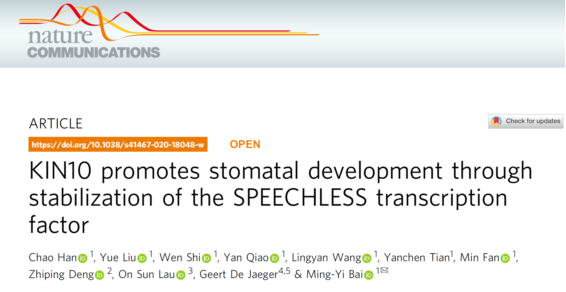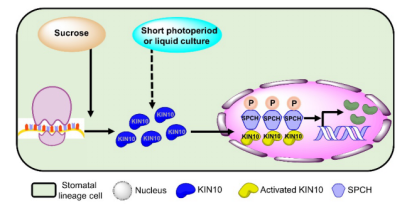Recently, Prof. Ming-Yi Bai's group, from the School of Life Science, Shandong University made new progress in SnRK1 regulating Arabidopsis stomatal development in response to different environmental conditions. Related results have been published on the international top journal Nature Communications entitled “KIN10 Promotes Stomatal Development through Stabilization of the SPEECHLESS Transcription Factor”. The first author is Dr. Chao Han from the School of Life Science. Prof. Ming-Yi Bai is the corresponding authors.

Sucrose non-fermenting-1 (SNF1)-related kinase 1 (SnRK1) is a central energy sensor kinase in plants that is functionally and evolutionarily conserved with SNF1 in yeast and AMP-activated kinase (AMPK) in animals, which maintain cellular and energy homeostasis for all living organisms. However, it is not clear how SnRK1 is activated and regulated by different environmental stimulus and phytohormone and how activated SnRK1 regulate plant development to adapt changing environments in plant.
In this study, authors found Arabidopsis performed stomatal development deficiency under weak light, short photoperiod and liquid conditions, which exogenesis sugar supply can recover this deficiency. SnRK1 complex catalytic subunit KIN10 participated this development. kin10 mutant performed lower stomatal index, while overexpression KIN10 induced higher stomatal index in these conditions. The authors proved that sucrose induced KIN10 protein accumulation by regulating translation. Moreover, KIN10 expression performed nuclear localization and interact with SPEECHLESS (SPCH) transcriptional factor, the master regulator for stomata formation, in stomatal lineage cells specifically. Finally, it is proved that KIN10 can phosphorylate and stabilize SPCH, thereby promoting stomatal development.

A model for KIN10-promoted stomatal development through phosphorylation and stabilization of SPCH
This work was funded by Shandong Province Agricultural Improved Variety Project, the National Natural Science Foundation of China, Shandong Province Natural Science Foundation and the Fundamental Research Funds of Shandong University.
The publication link: https://www.nature.com/articles/s41467-020-18048-w.

